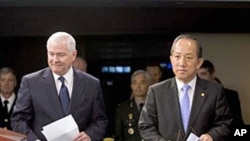The U.S. and South Korean defense ministers Friday pledged continued vigilance against any provocative action by North Korea, particularly as it moves through an expected transition of leadership from Kim Jung Il to his youngest son. The two ministers held annual defense talks at the Pentagon.
U.S. Defense Secretary Robert Gates and South Korea's Defense Minister Kim Tae-young signed several agreements designed to strengthen the alliance, including a joint strategy for developing operational plans. In a communiqué they said they want to expand the relationship to deal more with regional and international issues, but they also made clear their focus is on protecting South Korea from potential aggression by North Korea.
Neither man could confirm an Associated Press report that there has been a formal decision for Kim Jung Un to take power in North Korea after his father, but Secretary Gates said that is the expectation. He was asked whether there is concern that the political changes in North Korea could lead to more incidents like the sinking of the South Korean navy ship, the Cheonan, in March, which killed 46 sailors. An international investigation blamed North Korea, but its officials deny the charge.
"There's a lot of speculation about the circumstances that lay behind the sinking of the Cheonan and whether other provocations may follow," said Robert Gates. "I think that our meeting today should reinforce what we said, that provocations will not be tolerated. And I think it's a good thing at this point of transition in North Korea that our alliance is in fact, as both the minister and I have agreed, perhaps the strongest it's ever been."
Minister Kim said a further deterioration of Kim Jung Il's health or what the minister called a change in public opinion could lead to instability in North Korea, and could affect the security of both the North and the South. He said U.S. and South Korean forces are prepared for all possible contingencies.
Minister Kim said the United States and South Korea will monitor North Korean activities closely and will work together to respond as necessary.
The minister also said South Korea is ready for substantive talks with the North, but only if it admits responsibility for the Cheonan sinking, issues an apology, punishes those responsible and takes steps to prevent any further incidents. He also offered more economic help to the North if it cooperates with the international community.
That was an apparent reference to international efforts to convince North Korea to abandon its nuclear weapons program, which is also mentioned in Thursday's joint communiqué. The document says the United States and South Korea "will not accept North Korea as a nuclear weapons state."
It also pledges more joint exercises in response to the Cheonan sinking, including some in the Yellow Sea, west of the Korean Peninsula - a plan that has angered China. And the document confirms there will be no change to the number of U.S. troops stationed in South Korea - 28,500 - and that the United States will also use anti-missile defenses and nuclear weapons, if necessary, to defend the country.
This was the 42nd annual meeting between the U.S. and South Korean defense chiefs, and they pledged to hold another one next year in Seoul.




